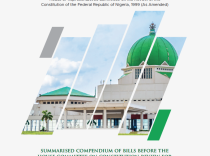On Wednesday 21st September 2016, one day after resumption from its annual recess, the Senate commenced debate on Nigeria’s economic challenges with a view to finding actionable solutions.
Senate Leader, Ali Ndume (APC: Borno) gave a historical background on the economic antecedents which has led the country to its current state. He stated that Nigeria was not alone in her current economic challenge as other countries such as Greece, Brazil, Ecuador, Italy and Ukraine who depend on oil revenue are undergoing economic hard times. Speaking further, he noted that most sectors of the Nigerian economy were in the negative as debt service currently stands at 1.36 Trillion. He attributed the current economic recession to dependency on oil and corruption.
While senators shared their thoughts and ideas on possible paths out of economic recession, a review of the current policy on Treasury Single Account (TSA) policy was proposed considering its impact on economic activities especially on Banks. It was recommended that the funds in the (TSA) lying fallow in the CBN be released to stabilize banks and aid the flow of funds to relevant sectors of the economy.
Other immediate, mid-term and long-term recommendations proffered on various sectors during the debate including the following:
Agriculture:
- Investment of funds in agriculture;
- Training of women and youths in poultry;
- Supply of fertilizers and seedlings to farmers at subsidized rates;
- Implementation of African Union resolution to set aside 10% of annual national budget for agriculture;
- Encourage growing and export of cash crops such as cotton, rubber, Groundnut and Cocoa;
- Establishment of an Agricultural Intervention Fund.
Financial:
- Release of (Stolen) funds recovered by government;
- Reduction of interest rates;
- Promotion of export in goods and services;
- Diversification of economy to other sectors such as Agriculture, Solid Minerals and Construction;
- Ban in importation of food stuff, stationeries, manufactured goods and clothing;
- Review of government Financial policies;
- Borrowing of Funds externally to fund 2016 budget to instill confidence and boost productivity;
- Harmonization of tax regime;
- Review of minimum wage to align with current economic realities and its removal from the exclusive legislative list to the concurrent list;
- Improved budget performance and implementation through cut in recurrent expenditure;
- Discourage saving of funds in domiciliary account.
Corruption:
- Revisit policy direction and set up machineries to make corruption impossible;
- Plea bargain with persons who have stolen funds to aid recovery of funds;
- Block leakages in Nigerian Customs Service to ensure optimum revenue generation.
Education:
- Reduction of examination fees for Jamb, WASSCE, NECO.
- Development of Nigeria’s education system to discourage studying abroad.
Information
- Build confidence by disseminating proper messages about Nigeria to create a good impression of Nigeria and attract foreign investment.
- Effective communication of government policy to prevent policy summersault.
Oil Sector:
- Establishment of refineries to avoid importation of petroleum.
- Negotiation with oil majors on terms of engagement.
Security:
- Dialogue with Militants in the Niger Delta.
Constitutional Amendment:
- Section 162 of the Constitution should be amended to remove sharing formula and give room for saving of funds.
Others:
- Constitution of CBN Board to avoid problems of policy implementation. The CBN Governor alone is incapacitated;
- Synergy between legislature and Executive in policy formulation and articulation;
- Restructuring of government by unbundling and relieving the Federal Government from the burden of being in charge of most sectors;
- Establishment of centers of excellence in health to prevent capital flight;
- Provision of steady power supply by granting concession to countries like China;
- Develop legal framework to support Sovereign Wealth Fund (SWF);
- Proper attention to social welfare and the plight of IDPs in camps;
- Optimism and prayers.
Senators however shared conflicting views on two (2) major issues. The first was the issue of replacement of the Minister of Finance, Mrs. Kemi Adeosun and Minister of Budget and National Planning, Sen. Udoma Udo Udoma. While some felt that a change would not translate to much because of the state of the economy, others felt it was expedient to replace both ministers due to their inability to deliver on expectations.
The second issue was on the sale of Governments assets. Some legislators felt it was necessary for government to sell its assets to raise funds. Others opined that sale of assets was not an option.
Following extensive deliberation on the economic challenges the Senate adjourned to Thursday 22nd, September 2016.





